Principles of Economic Liberty: The Biblical Case for Free Enterprise
A Six-Session Bible Study Series Based on the Word Foundations Series of Articles Titled “The Bible and Free Enterprise”
“The Bible and Free Enterprise” is a Word Foundations series of articles that makes the case that the free enterprise economic model, or capitalism, is biblical. While free enterprise can be distorted and abused, the distortions are departures from biblical principles and a biblical worldview. Now more than ever, Christians must understand and be able to articulate that free enterprise, or capitalism, is rooted in biblical teachings and fosters qualities the Scripture commends. Not convinced? In this six-session series, you’ll encounter overwhelming evidence. The Bible is not silent about economic freedom!
Session 3
HUMAN DIGNITY
All men are created equally free and independent, and have certain inherent rights, of which they cannot, by any compact, deprive or divest their posterity; among which are the enjoyment of life and liberty, with the means of acquiring and possessing property, and pursuing the obtaining of happiness and safety.
—Founding Father George Mason—
The principles covered in this session are highlighted in part 2 of “The Bible and Free Enterprise.”
Begin by reminding participants that you’re traveling together on a journey to explore ways that capitalism, or the free enterprise economic model of financial exchange, aligns with biblical teachings. Say: Our journey is placing ten principles before us. These tenets have been derived heavily, but not exclusively, from a paragraph appearing in an article by Dr. Ronald Nash affirming capitalism as biblical.
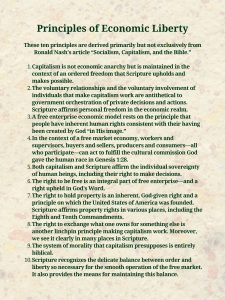
A PDF file of the above graphic is available here.
During this session we will examine principles 3 & 4 on our list.
-
-
- A free enterprise economic model rests on the principle that people have inherent human rights consistent with their having been created by God “in His image.”
- In the context of a free market economy, workers and supervisors, buyers and sellers, producers and consumers—all who participate—can act to fulfill the cultural commission God gave the human race in Genesis 1:28.
-
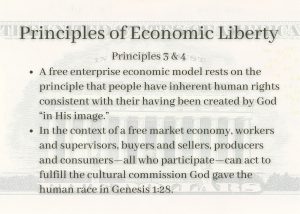
A PDF file of the above graphic is available here.
Principle Three
A free enterprise economic model rests on the principle that people have inherent human rights consistent with their having been created by God “in His image.”
Remind the members of your group that you concluded Session 2 with this quote from Rabbi Daniel Lapin: “The atheist himself recognizes that, to be true to his credo, he must reject the free market because it is appointed by a God in whom he does not believe. The world still awaits a society that has embraced atheism and also operates a successful free market.”1
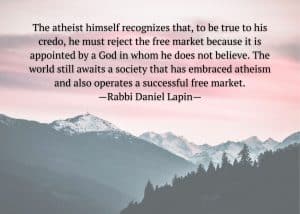
A PDF file of this graphic is available here.
In advance, visit this page for some important background information related to Rabbi Lapin’s statement.
Ask: What is your response to Rabbi Lapin’s statement? Do you readily affirm it? question it? cringe when you hear it? Explain.
Continue: The free enterprise economic system rests on a high view of humanity, one that recognizes human sovereignty and personal freedom within the limits of reality and the moral laws of God. This gives people freedom to initiate creative ideas, be productive, and prosper in ways that benefit, not just themselves, but others as well. In other words, it recognizes inherent human rights. People can have inherent or unalienable rights only if they are special, only if they are qualitatively different from machines and every member of every other living species. It is God’s having made people in His image that gives human beings this qualitative difference. All people have inherent God-given rights.

Elaborate: We can clearly see the qualitative superiority of people over animals and machines in economic transactions. We might be able to program a machine to calculate which of several purchase options would be the most “cost effective,” but people bring preferences, desires, instincts, drive, and emotions to transactions that influence their decisions and that no machine can duplicate. Moreover, while an animal can, in a sense, “understand” basic physical activities like eating and sleeping, it cannot begin to comprehend the experience of making a purchase or closing a sale. Economic decisions and exchanges, unlike eating and sleeping, have a spiritual component, one that only humans, who have been made in God’s image, can fully experience and appreciate. (Background information: The preceding statements summarize Rabbi Lapin’s statement in its larger context.)
To acknowledge that human beings have “inherent rights,” or rights that are theirs simply because they are human (translation: rights that are theirs because God created them in His image), is to affirm that human beings are unique and special. It is to admit at least the possibility that God’s “fingerprints” are all over each individual person. This the atheist cannot abide.
But human beings are special. They are unique. And their uniqueness is obvious to anyone who is willing to hear what “the Laws of Nature and of Nature’s God” declare. Their uniqueness also is obvious to everyone willing to observe economic transactions under the free market system and honestly interpret what they tell us about people — and their Creator.
Exercise: Ask participants to brainstorm qualities that set apart human beings from machines and animals. You may do this as one large group or as two or more smaller groups. Here is a list of 31 distinctive human qualities. Before looking at the list, though, see if you and your group(s) can name at least two dozen items on your own. If two or more groups are doing this exercise, have each one report to the larger group.
The Nature of Unalienable Rights
In advance, before leading the Bible study session, please read this important background information about the nature of unalienable (or inalienable) rights. This is an extremely important article! It explains that unalienable, God-given rights are about more than having the freedom to do what one desires to do, and that they’re even about more than having the freedom to do what one desires to do within the limits of ethical and legal guidelines. Unalienable rights also are about responsibilities. We will dive into this idea and explore it more thoroughly momentarily with the help of Christian leader and podcaster Jon Harris.
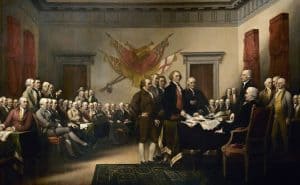
Direct participants’ attention once again to Principle 3.
A free enterprise economic model rests on the principle that people have inherent human rights consistent with their having been created by God “in His image.
State: We have a major problem today. Today most Americans see rights as privileges or assets the government is authorized to create for them or distribute (or redistribute) to them. They see no connection between rights and responsibilities.
The Founders of this country had a very different perspective.
-
-
- They saw rights as God-given and therefore needing government recognition and protection.
- With rights recognized, respected, and protected, each individual was to enjoy them and use them as he or she worked to realize his or her God-given potential.
- The quest to fulfill one’s potential necessarily included fulfilling duties and responsibilities.
- Even with, and in some cases especially with, fulfilling duties came a great deal of happiness and fulfillment. Government stayed out of the way, except to keep people from violating the rights of others.
-
Let’s examine the Founders’ perspectives on rights, pursuit of happiness, and fulfillment of duties; and the connections between these.
Gaining A New Perspective on Happiness and Rights by Uncovering Founding—and Biblical—Ideals
Display this graphic and discuss it briefly. Ask: What is your response to this idea? What would be the response of most 21st-century Americans to it? Yet this was the perspective the Founders held.

A PDF file of this graphic is available here.
Divide the large group into two. Ask participants to visit www.wordfoundations.com/foundingperspectives. Assign a link to each group and give groups time to listen to and discuss the material on its assigned webpage. After enough time has passed (10 to 12 minutes), ask groups to summarize their discussions and the insights they learned. For your convenience, here are the webpages:
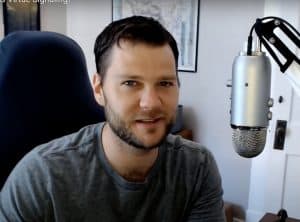
Group 1: What did the Founders believe about happiness?
Group 2: What did they believe about rights?
Summarize: The Founders believed that
-
-
- rights and duties cannot be separated, that
- performance of duty is essential to one’s happiness, and that
- one’s freedom or right to fulfill his duties on his own terms, without interference from or even help from the government, also is essential to happiness and fulfillment.
-
Ask:
-
-
- Certainly duties are confining in a number of ways, but do we tend generally to feel they are confining and not at all liberating? If so, why? How would a change of perspective help us?
- How are duties truly liberating, despite our inclination to feel they only are confining?
-
Note that Zig Ziglar said, “If you will be hard on yourself, life will be easy on you. But if you insist upon being easy on yourself, life is going to be very hard on you.”
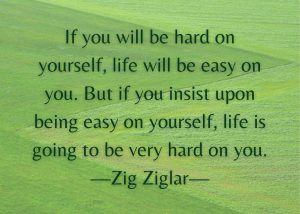
A PDF file of this graphic is available here.
He was echoing a biblical principle. Proverbs 10:4 says, “He who has a slack hand becomes poor, But the hand of the diligent makes rich.”
We Demonstrate Human Dignity When We Exercise Our Unalienable Rights
Ask: What are some of the inherent rights in human beings that capitalism affirms? Ronald Nash names four, but his list is representative, not exhaustive. Here are the four he specifically mentions.
-
-
- the right to make decisions,
- the right to be free,
- the right to hold property, and
- the right to exchange what one owns for something else
-
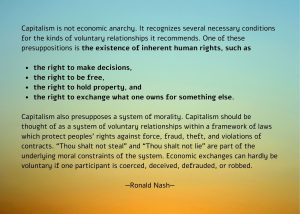
A PDF file of this graphic is available here.
Introduce the Bible passage. Say: We will consider each of these rights individually in upcoming sessions. We’ll take the first and second of these when we consider Principles 5 & 6 during session 4, and we’ll take the third and fourth when we consider Principles 7 & 8 during session 5. For now, let’s look at an individual in Scripture who takes full advantage of these rights. Her example is instructive to all, men and women alike. Probably no passage presents a more beautiful portrait of human dignity in the context of the the free market than Proverbs 31:10-31.

Distribute one copy of this worksheet to each participant.
-
-
- Suggest participants may want to get in groups of 3 or 4.
- Give them several minutes to read the passage and to make notes.
- Allow a few more minutes for small groups to discuss responses.
- Finally, facilitate a brief “wrap-up” discussion with the large group.
-
Ask:
-
-
- What ideas arising from this exercise stood out to you?
- How might our lives be affected if we saw pursuit of happiness in terms of efforts to fulfill responsibilities, as does the virtuous wife?
- How does the freedom afforded by capitalism aid this woman in her quests to fulfill her responsibilities and to pursue happiness?
-
Point out that in Proverbs 31:10-31, as well as in the rest of Scripture, free enterprise isn’t defended, but assumed. Emphasize that by assuming capitalism as the norm, the Bible upholds it in the strongest possible way.
Principle Four
In the context of a free market economy, workers and supervisors, buyers and sellers, producers and consumers—all who participate—can act to fulfill the cultural commission God gave the human race in Genesis 1:28.
On the heels of having created the first man and woman in His image, God did something else that was extraordinary. Here is Genesis 1:26-28 (emphasis added):
26 Then God said, “Let Us make man in Our image, according to Our likeness; let them have dominion over the fish of the sea, over the birds of the air, and over the cattle, over all the earth and over every creeping thing that creeps on the earth.” 27 So God created man in His own image; in the image of God He created him; male and female He created them. 28 Then God blessed them, and God said to them, “Be fruitful and multiply; fill the earth and subdue it; have dominion over the fish of the sea, over the birds of the air, and over every living thing that moves on the earth.”
We Find the Cultural Commission in Genesis 1:28
A portion of this section is based on material in this article:
In their book How Now Shall We Live? Charles Colson and Nancy Pearcy contend that when God gives this directive to Adam and Eve, He essentially passes the baton of work in the world to the human agents He has created. God will not abandon them, but He intends to involve them directly. A great deal of social and cultural work now must be done to maintain the created order; and now, people will accomplish this work. Genesis 1:28 has been called the cultural commission. Again, verse 28 says,
Then God blessed them, and God said to them, “Be fruitful and multiply; fill the earth and subdue it; have dominion over the fish of the sea, over the birds of the air, and over every living thing that moves on the earth.”
The specific tasks involved in the cultural commission relate directly to the God-given responsibilities of having dominion over creation and filling and subduing the earth. Pastor Sam Jones notes,
Embedded in this divine command is the principle of private property. Significantly, the Lord issued this directive to people; no government existed when He gave it. An individual neither can subdue nor have dominion over something that is not his; nor can a group of people in voluntary cooperation (the modern equivalent would be a company) exercise authority over something that isn’t privately owned. In Genesis 1, therefore, we see a strong indication of God-given rights to own and to manage property.3

A PDF file of this graphic is available here.
In Session 5 we’ll examine a good number of Scriptures upholding property rights, but here we need to understand that ownership and management of resources is a means by which we reflect the realities that
-
-
- God made us in His image and
- we are responsible to fulfill the purposes He ordained for our lives, including the cultural commission.
-
Brainstorm with your participants: What kinds of activities are involved in fulfilling the cultural commission (Gen. 1:28)? The following paragraph highlights several items.
It’s true that sin entered the world since God gave the command we find in Genesis 1:28, but the tasks of human beings remain essentially the same. Couples still bear children and rear them in the context of family. People still plant and tend crops and raise animals for food and to perform needed services. They form and maintain neighborhoods, communities, cities, and nations. They also engage in creative endeavors by writing and performing music, producing works of literature, making films, and creating works of visual art.4
In the context of life as it continues to unfold, believers have countless special opportunities to show the world what Christ would do were He physically present and involved in a wide variety of endeavors. This is image-bearing at its best, and it includes work-related activities and business transactions.
Commissioned by God; Accountable to God
There’s more. While God has delegated authority to humankind, He also remains in absolute authority, and every individual is accountable to Him. Thus, people are charged not only with fulfilling the cultural commission under God, but also with respecting the rights of others to do the same.
This is why Dr. Gary Amos contends, “The image of God in man, and man’s possession of the creation mandate with its twin aspects of duty and authority are the starting point for the Biblical model of rights.”5 They also make up the soil in which human dignity takes root and grows. You can read Dr. Amos’s statement in context here.
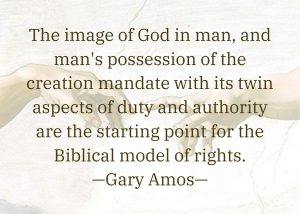
A PDF file of this graphic is available here.
Capitalism Affirms Human Dignity
Can you now see why Rabbi Daniel Lapin is correct when he says, “The atheist himself recognizes that, to be true to his credo, he must reject the free market because it is appointed by a God in whom he does not believe. The world still awaits a society that has embraced atheism and also operates a successful free market”?4

A PDF file of this graphic is available here.
Emphasize: The free market is not only a system that God has appointed; it’s also one that, having been appointed by God, unambiguously promotes an environment in which human freedom and dignity, along with rights tethered to duties, readily will thrive. These qualities testify to God’s image in man, so the atheist is compelled to reject the system that upholds them…
…and embrace socialism.
Close in prayer: Dear God, thank you for an economic system that recognizes human nature as great, yet also as flawed. Thank Him for a system that, despite humanity’s flaws, allows a great deal of freedom and that encourages productivity, prosperity, and excellence. After all, when we as human beings strive for excellence in our quests to be productive and prosperous in our work and in other endeavors, we demonstrate that you created us and stamped your image upon us. What a privilege! In Jesus’ name. Amen.
Leave participants with this quote by Thomas Jefferson:
Rightful liberty is unobstructed action according to our will within limits drawn around us by the equal rights of others. I do not add “within the limits of the law” because law is often but the tyrant’s will, and always so when it violates the rights of the individual.
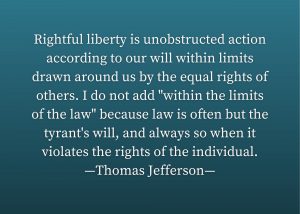
A PDF file of this graphic is available here.
Looking Ahead
Session 4 will explore the theme of individual choice by examining principles 5 & 6. These tenets are highlighted in part 2 of the series “The Bible and Free Enterprise.”
-
-
- Both capitalism and Scripture affirm the individual sovereignty of human beings, including their right to make decisions.
- The right to be free is an integral part of free enterprise—and a right upheld in God’s Word.
-
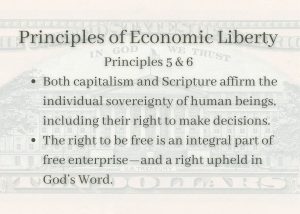
A PDF file of this graphic is available here.
-
-
- Session 4 is available here.
- List of Principles of Economic Liberty
- Principles of Economic Liberty Bible Study Home Page
-
Copyright © 2021 by B. Nathaniel Sullivan. All rights reserved.
top image credit: Photo by Clay Banks on Unsplash
Notes:
1Rabbi Daniel Lapin, America’s Real War: An Orthodox Rabbi Insists that Judeo-Christian Values Are Vital for Our Nation’s Survival, (Sisters, OR: Multnomah Publishers, 1999), 217.
2Charles Colson and Nancy Pearcey, How Now Shall We Live? (Wheaton, IL: Tyndale, 1999), 295.
3Pastor Sam Jones, 5 Steps to Kill a Nation: And How to Stop the Bleeding, (Newport Beach, CA: The GK Publishing Company, 2020), 73.
4Colson and Pearcey.
5Gary Amos, Defending the Declaration: How the Bible and Christianity Influenced the Writing of the Declaration of Independence, (Brentwood, TN: Wolgemuth and Hyatt, 1989), 107. Go here to read the quoted statement in context.
6Lapin.
